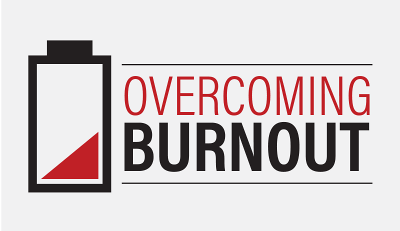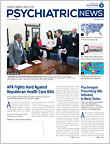Burnout—the phenomenon of mental exhaustion and emotional depletion—is experienced and understood by physicians perhaps more so than many other professionals. When physicians talk about burnout, other physicians—that is, you—know what they are saying.
That’s why Psychiatric News will be featuring commentary over the next year from APA members offering their unique perspectives on burnout, wellness, and resilience. Experts from the recently appointed APA Work Group on Physician Wellness and others who have a special insight on the subject will provide personal accounts of their experience of burnout and strategies for maintaining wellness and resilience, and offer knowledgeable commentary about research, treatment, and institutional and health system approaches to dealing with the problem.
“Burnout is pervasive in modern medicine,” said APA President Anita Everett, M.D., who has made the subject a priority of her presidential year. She noted that a December 2015 report in Mayo Clinic Proceedings found that in 2014, roughly 54 percent of the physicians surveyed had at least one symptom of burnout. When compared with 2011, rates of burnout among physicians were higher in 2014, and satisfaction with work-life balance was lower (41 percent versus 49 percent).
Everett added that many aspects of modern American medicine—with its cumbersome electronic health records, excessive productivity quotas, limits on the time physicians can spend with each patient, loss of professional autonomy, and excessive documentation requirements—have become sources of professional dissatisfaction. Some stressors adversely affect psychiatrists uniquely: limited resources, high work demands, and patient violence.
“Most of us have felt some degree of compassion fatigue in our careers,” she said. “Some of us may have even experienced deep and pervasive episodes of burnout that have had an impact both on our practice of medicine and on our home lives.”
Tragically, Everett noted, suicides by medical students, residents, and physicians have brought the subject of physician well-being to public attention and turned the issue into an acute one for organized medicine.
Everett believes the subject of burnout—powerfully impacting the professional lives of APA members—is ripe for address by professional organizations like APA. And active engagement of members in the organizational life of APA can be a strong deterrent to burnout, she believes.
“Involvement in a professional society can empower members, providing a sense of collegial community and a venue for re-embracing the passion that caused us to want to be physicians in the first place,” she said.
The Psychiatric News series will begin in the next issue with a report from work group chair Richard Summers, M.D., on the town hall discussion on burnout that was held at APA’s 2017 Annual Meeting in San Diego. Other subjects to be addressed in coming issues include evidence-based interventions for physicians with depression, perspectives on burnout and resilience from senior psychiatrists, efforts to promote medical student wellness, incorporation of mindfulness training into professional practice, ACGME efforts around the issue of wellness and burnout, physician mental health issues and state licensing boards, and organized-medicine and institutional-level approaches to preventing and treating burnout.
Everett said she believes the Psychiatric News series will be a popular feature and one that members will look forward to from one issue to the next.
“It is my hope that the series will provide real tools that our members can use in their daily professional lives to stay healthy and to remain passionate about the vital work we do with our patients,” she said. ■

